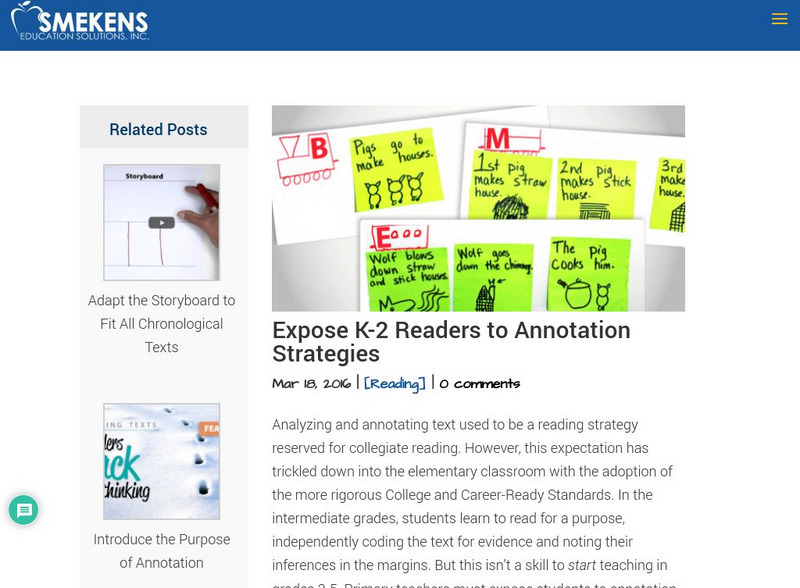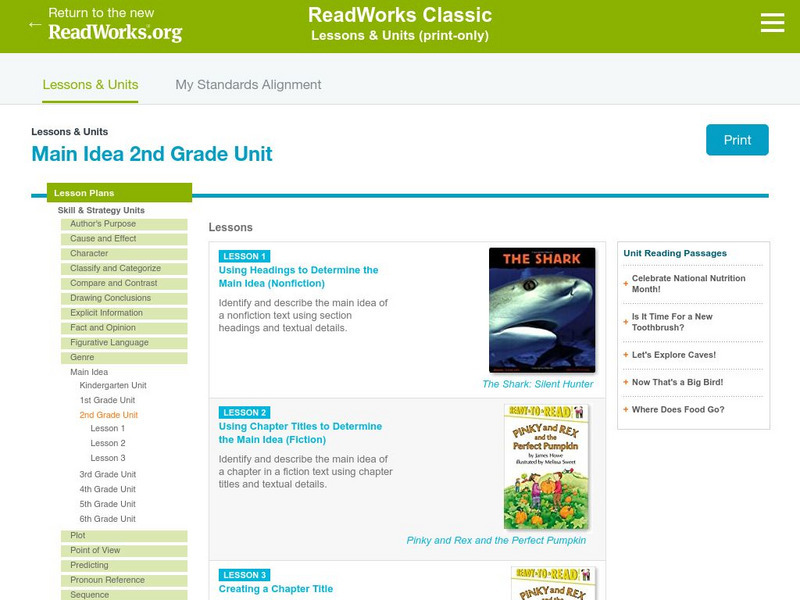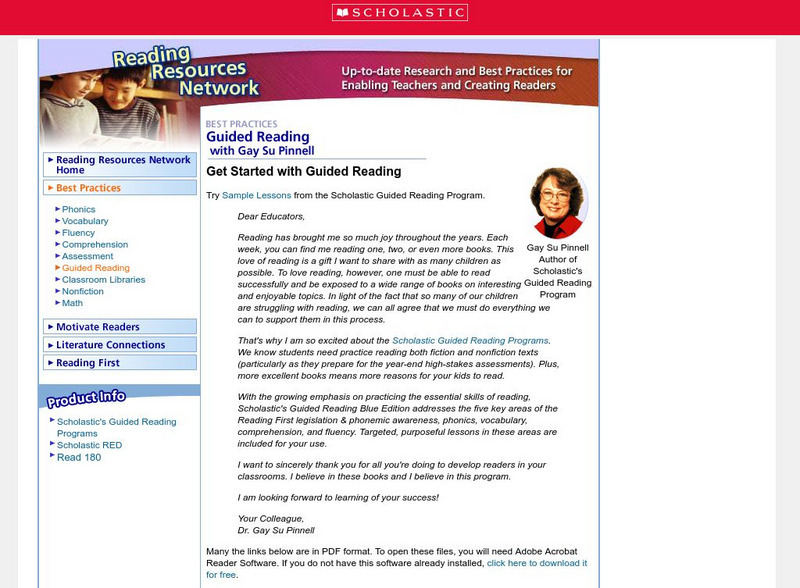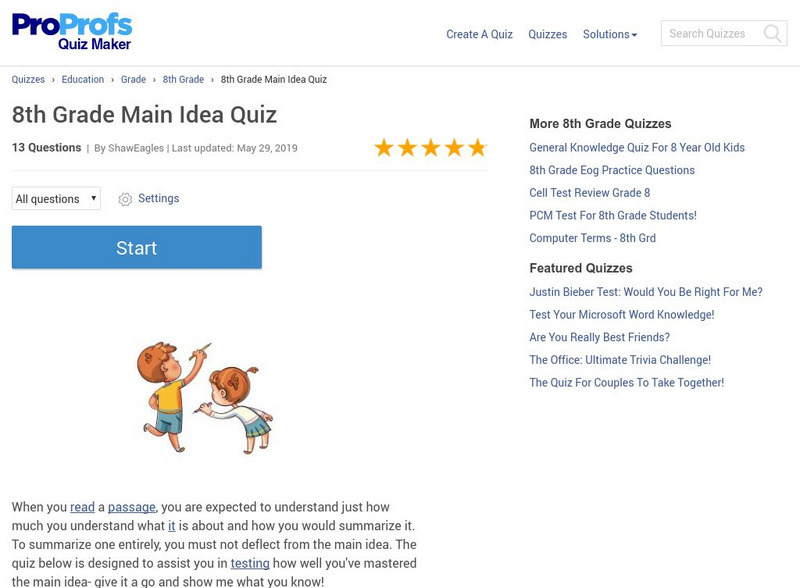Hi, what do you want to do?
Read Works
Read Works: Lesson 2: First and Last Sentences (Passage)
[Free Registration/Login Required] Students comprehension will be reinforced as they reading first and last sentences of paragraphs. Direct teaching, guided practice, and independent worksheets are available for this third grade lesson.
Better Lesson
Better Lesson: Topic Sentences
Often, we ask students to find the main idea in the story- this helps when re-telling. Why not apply this idea to writing? Find the main idea and introduce your writing with that idea; just like with a book, it helps with re-telling!...
Other
Smekens Educational Solutions: Expose K 2 Readers to Annotation Strategies
This article discusses how to begin teaching students in K-2 to record their ideas about text using highlighters, colored pens, large graphic organizers, and sticky notes. Students can retell a story with a storyboard, use a web to find...
PBS
Pbs Learning Media: Lorraine Hansberry: "A Raisin in the Sun": Analyzing Theme
In this interactive lesson, discover how literary techniques like setting, characterization, and conflict contribute to the overarching theme of a text. Through analysis of Lorraine Hansberry's iconic play A Raisin in the Sun, explore...
Louisiana Department of Education
Louisiana Doe: Louisiana Believes: English Language Arts: Grade 6: If Stones Could Speak
Sixth graders will explore history and will learn that archaeologists, like detectives, work to piece together the past through investigation. Archaeological research provides us with stories of human history that help us understand the...
PBS
Pbs Learning Media: Reach: Recipe for Writing!
REACH for more! Be an author! Write and illustrate your very own story by mixing up a simple recipe of WHO, WHERE, WHAT, and ENDING.
Read Works
Read Works: Grade 2: Three Lesson Unit: Main Idea
[Free Registration/Login Required] A series of three lesson plans designed to teach students to identify main ideas through headings and chapter titles, and then to write appropriate titles of their own. Lessons are based on the books...
Scholastic
Scholastic: Getting Started With Guided Reading
How do you get started with guided reading? At this site one can find the answer to this question. The online lesson plans will help get students started with guided reading.
PBS
Pbs: Multiple Methods of Reading Instruction
This article surveys three strategies to incorporate into classroom repertoire. They include guided reading, choral reading, and readers' theater.
ProProfs
Pro profs.com: 8th Grade Main Idea Quiz
An interactive quiz with four short passages and thirteen multiple choice and extended response questions focusing on main ideas and supporting details. Students can access all passages and questions without an account, but a free...
PBS
Pbs Learning Media: Cloud
A round up of wild horses proves too strenuous for a young colt in this video segment from Nature. Watch a video about this and follow up with discussion and writing prompts. [7:06]
Beacon Learning Center
Beacon Learning Center: Web Lesson: Did I Read It: Implicit vs Explicit Details
Follow Carson through a lesson in order to become a better reader of informational text. Learn the difference between implicit and explicit information. Includes multiple interactive assessments and reading activities.
Polk Brothers Foundation Center for Urban Education at DePaul University
De Paul University: Center for Urban Education: Spring Is Coming [Pdf]
"Spring is Coming" is a one page, fictional, reading passage about a family of settlers who had survived the winter, but needed food. Their Native American neighbors showed them onions growing and gave them new hope. It is followed by...
Polk Brothers Foundation Center for Urban Education at DePaul University
De Paul University: Center for Urban Education: The Technology Trip [Pdf]
"The Technology Trip" is a one page, fictional, reading passage about children who planned a trip to the museum using the Internet to find the bus schedule. On the way, the bus was hit by a car so another bus had to take them. It is...
Polk Brothers Foundation Center for Urban Education at DePaul University
De Paul University: Center for Urban Education: Transportation Changes [Pdf]
"Transportation Changes" is a one page, nonfiction, reading passage about the history of transportation across both land and sea. It is followed by questions which require students to provide evidence from the story; it includes:...
Polk Brothers Foundation Center for Urban Education at DePaul University
De Paul University: Center for Urban Education: Seasons on the Prairie [Pdf]
"Seasons on the Prairie" is a one page, nonfiction, reading passage about the different seasons in the prairie and the lighting fires that help prairie plants grow. It is followed by constructed-response questions which require students...
Polk Brothers Foundation Center for Urban Education at DePaul University
Depaul University: Center for Urban Education: The Working Tools of Insects[pdf]
"The Working Tools of Insects" is a one page, nonfiction, reading passage about insects that have special tools like the sawfly and the poppy-bee. It is followed by questions which require students to provide evidence from the story; it...
Polk Brothers Foundation Center for Urban Education at DePaul University
De Paul University: Center for Urban Education: Today's Telephone [Pdf]
"Today's Telephone" is a one page, nonfiction, reading passage about the history of telephones from the telegraph, to land-lines, to cell phones. It is followed by questions which require students to provide evidence from the story; it...
Polk Brothers Foundation Center for Urban Education at DePaul University
De Paul University: Center for Urban Education: Public Transportation [Pdf]
"Public Transportation" is a one page, nonfiction passage about public transportation in Chicago helps people get where they want to go and provides jobs for many people. It is followed by questions which requires students to provide...
Polk Brothers Foundation Center for Urban Education at DePaul University
De Paul University: Center for Urban Education: Read to Learn About City Systems [Pdf]
"Read to Learn about City Systems" is a one page, nonfiction passage about government systems and workers that keep people safe including police officers, food inspectors, and water and sewer system workers. It is followed by an...
Polk Brothers Foundation Center for Urban Education at DePaul University
De Paul University: Center for Urban Education: Read to Learn About Elections [Pdf]
"Read to Learn about Elections" is a one page, nonfiction passage about government systems and workers that keep people safe including police officers, food inspectors, and water and sewer workers. It is followed by an open-ended...
Polk Brothers Foundation Center for Urban Education at DePaul University
De Paul University: Center for Urban Education: Seasons on the Prairie [Pdf]
"Seasons on the Prairie" is a one page, nonfiction, reading passage about what grew in the prairie each season. It is followed by questions which require students to provide evidence from the story; it includes: choosing five important...
Polk Brothers Foundation Center for Urban Education at DePaul University
De Paul University: Center for Urban Education: Nutrition Lesson [Pdf]
"Nutrition Lesson" is a one page, nonfiction passage about protein including what it does in the body and what foods contain protein. It is followed by questions which require students to provide evidence from the story; it includes...
Polk Brothers Foundation Center for Urban Education at DePaul University
De Paul University: Center for Urban Education: Seasons on the Prairie [Pdf]
"Seasons on the Prairie" is a one page, nonfiction, reading passage about what its like during each season on the prairie. It is followed by questions which require students to provide evidence from the story; it includes: determining...













